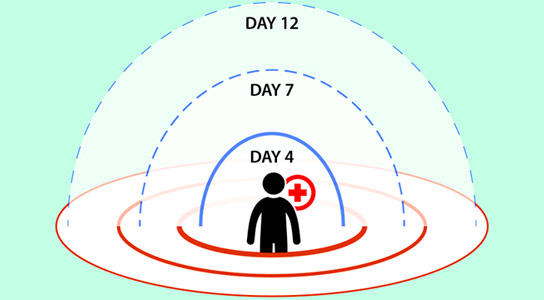Targeted Isolation May Be the Most Effective Way to Reduce Transmission of Ebola
16:44 New research led by the Yale School of Public Health shows that isolating 75% of infected individuals in critical condition within four days of symptom onset has a high chance of eliminating the spread of Ebola.
New research led by the Yale School of Public Health shows that isolating 75% of infected individuals in critical condition within four days of symptom onset has a high chance of eliminating the spread of Ebola.
Isolating the most severely ill Ebola patients before the fifth day of their illness may be the most effective way to reduce transmission of the virus, new research led by the Yale School of Public Health suggests.
A team of scientists from Yale and Liberia created a disease transmission model that uses epidemiological and clinical data from Liberia, the country hardest hit by the current outbreak. They found that each infected person is transmitting the disease to 1.73 other people. But people who will eventually die from the disease are spreading it even further, causing 2.36 people to become infected.
The researchers’ model found that isolating 75% of infected individuals in critical condition within four days of symptom onset has a high chance of eliminating the spread of the disease. The research is published October 28 in the Annals of Internal Medicine.
“In the absence of sufficient isolation units, our model emphasizes that targeted isolation of those who are mostly responsible for transmission may be the most efficient way to contain Ebola,” said lead author Dan Yamin, a postdoctoral associate at Yale School of Public health.
Senior author Alison P. Galvani, a professor of epidemiology at the School of Public Health, added, “In particular, infectiousness increases greatly with disease progression, and thus early case-isolation is paramount to reducing household and community transmission.”
This new Ebola transmission model is believed to be the first to consider the effect of disease progression, the rate at which the virus replicates in the body, and the link between the risk of mortality and transmission to others.
The Ebola outbreak now sweeping West Africa is the worst ever recorded. There have been approximately 9,000 reported cases and 4,500 deaths from the disease in Liberia, Sierra Leone, and Guinea since the outbreak began last December. For the first time, cases have been confirmed among healthcare workers treating patients in the United States and parts of Europe. Co-author Dr. Frederick Altice, professor of internal medicine and public health added, “Lessons from Liberia and this modeling study have important implications for the ill-advised current quarantine regulations that have been imposed in several states, which are not based on solid public health principles.”
The researchers acknowledge that the model has several limitations, including projections that are based upon initial dynamics of the epidemic. While these projections may change as the outbreak and interventions evolve, note the researchers, they nonetheless suggest that effective isolation, through the construction of sufficient numbers of Ebola isolation units is crucial to containing the epidemic.
Other authors on the study included Shai Gertler, Martial L. Ndeffo-Mbah, Laura A. Skrip, Mosoka Fallah, and Tolbert G. Nyenswah.
The National Institutes of Public Health funded the study.


0 comments